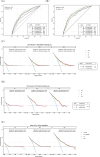Development and validation of an inflammatory biomarkers model to predict gastric cancer prognosis: a multi-center cohort study in China
- PMID: 38858653
- PMCID: PMC11163779
- DOI: 10.1186/s12885-024-12483-4
Development and validation of an inflammatory biomarkers model to predict gastric cancer prognosis: a multi-center cohort study in China
Abstract
Background: Inflammatory factors have increasingly become a more cost-effective prognostic indicator for gastric cancer (GC). The goal of this study was to develop a prognostic score system for gastric cancer patients based on inflammatory indicators.
Methods: Patients' baseline characteristics and anthropometric measures were used as predictors, and independently screened by multiple machine learning(ML) algorithms. We constructed risk scores to predict overall survival in the training cohort and tested risk scores in the validation. The predictors selected by the model were used in multivariate Cox regression analysis and developed a nomogram to predict the individual survival of GC patients.
Results: A 13-variable adaptive boost machine (ADA) model mainly comprising tumor stage and inflammation indices was selected in a wide variety of machine learning models. The ADA model performed well in predicting survival in the validation set (AUC = 0.751; 95% CI: 0.698, 0.803). Patients in the study were split into two sets - "high-risk" and "low-risk" based on 0.42, the cut-off value of the risk score. We plotted the survival curves using Kaplan-Meier analysis.
Conclusion: The proposed model performed well in predicting the prognosis of GC patients and could help clinicians apply management strategies for better prognostic outcomes for patients.
Keywords: Gastric cancer; Inflammatory biomarkers; Machine learning; Overall survival; Prognosis.
© 2024. The Author(s).
Conflict of interest statement
The authors declare no competing interests.
Figures




Similar articles
-
Identification of a Tumor Microenvironment-relevant Gene set-based Prognostic Signature and Related Therapy Targets in Gastric Cancer.Theranostics. 2020 Jul 9;10(19):8633-8647. doi: 10.7150/thno.47938. eCollection 2020. Theranostics. 2020. PMID: 32754268 Free PMC article.
-
A Novel Nomogram Integrated with Inflammation-Based Factors to Predict the Prognosis of Gastric Cancer Patients.Adv Ther. 2020 Jun;37(6):2902-2915. doi: 10.1007/s12325-020-01356-4. Epub 2020 May 3. Adv Ther. 2020. PMID: 32363466
-
Development and validation of a nomogram to predict the prognosis of patients with gastric cardia cancer.Sci Rep. 2020 Aug 24;10(1):14143. doi: 10.1038/s41598-020-71146-z. Sci Rep. 2020. PMID: 32839498 Free PMC article.
-
A nomogram model based on the number of examined lymph nodes-related signature to predict prognosis and guide clinical therapy in gastric cancer.Front Immunol. 2022 Nov 2;13:947802. doi: 10.3389/fimmu.2022.947802. eCollection 2022. Front Immunol. 2022. PMID: 36405735 Free PMC article.
-
Development and Validation of a Robust Immune-Related Prognostic Signature for Gastric Cancer.J Immunol Res. 2021 Apr 30;2021:5554342. doi: 10.1155/2021/5554342. eCollection 2021. J Immunol Res. 2021. PMID: 34007851 Free PMC article.
Cited by
-
Application and progress of nomograms in gastric cancer.Front Med (Lausanne). 2025 Jan 29;12:1510742. doi: 10.3389/fmed.2025.1510742. eCollection 2025. Front Med (Lausanne). 2025. PMID: 39944483 Free PMC article. Review.
References
-
- Amin MB, Greene FL, Edge SB, Compton CC, Gershenwald JE, Brookland RK, Meyer L, Gress DM, Byrd DR, Winchester DP. The Eighth Edition AJCC Cancer staging Manual: continuing to build a bridge from a population-based to a more personalized approach to cancer staging. CA Cancer J Clin. 2017;67(2):93–9. doi: 10.3322/caac.21388. - DOI - PubMed
Publication types
MeSH terms
Substances
Grants and funding
LinkOut - more resources
Full Text Sources
Medical
Research Materials
Miscellaneous

